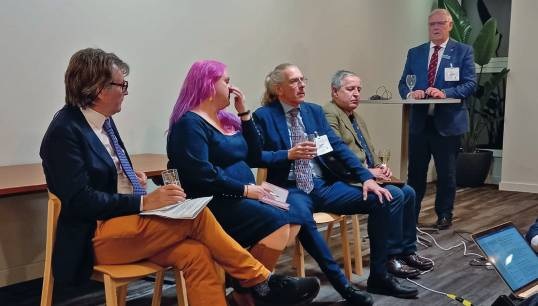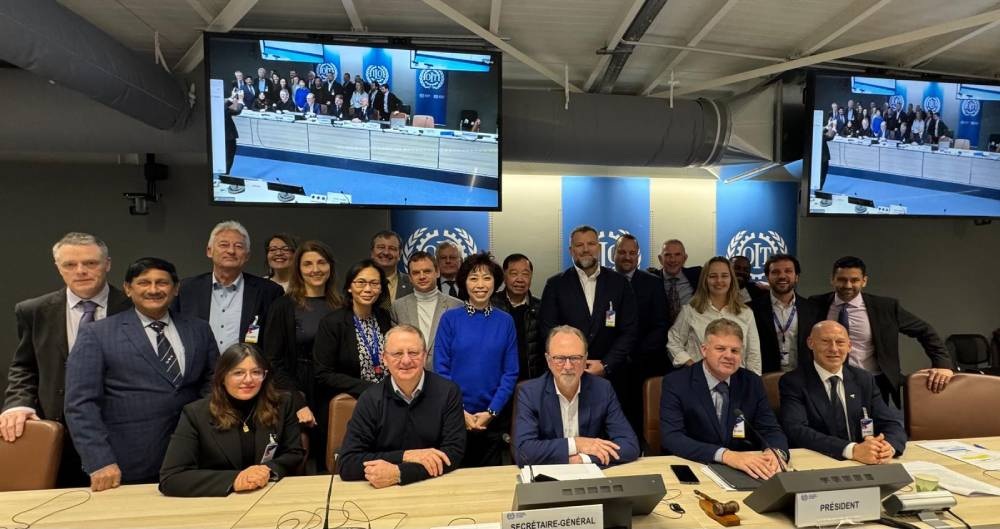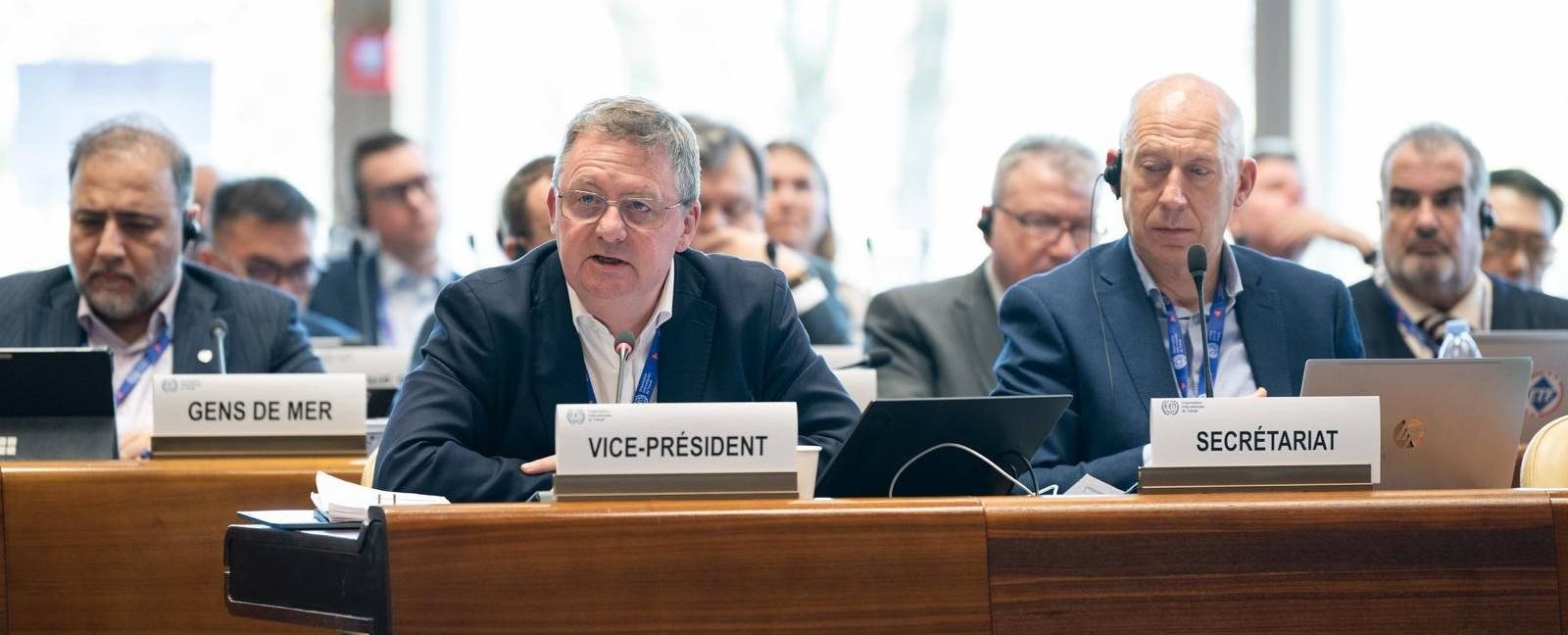- Topics
- Campaigning
- Careers
- Colleges
- Community
- Education and training
- Environment
- Equality
- Federation
- General secretary message
- Government
- Health and safety
- History
- Industrial
- International
- Law
- Members at work
- Nautilus news
- Nautilus partnerships
- Netherlands
- Open days
- Opinion
- Organising
- Podcasts from Nautilus
- Sponsored content
- Switzerland
- Technology
- Ukraine
- United Kingdom
- Welfare

Nautilus director of legal services Charles Boyle shares a year of legal highlights with Rob Coston – from defending members involved in maritime incidents to winning millions in compensation, and establishing essential new rights for seafarers worldwide
ROB COSTON (RC): At the international level, the Maritime Labour Convention is a living instrument that guarantees certain rights for seafarers. There's been a raft of updates this year – can you outline those?
CHARLES BOYLE (CB): This year, we went to Geneva as part of the ITF delegation and participated in formulating the 2025 amendments to the MLC. These include many important new rights such as improved access to shore leave;designation of seafarers as keyworkers; and recognition within the convention that stakeholders must take account of the ILO-IMO Guidelines on fair treatment of seafarers detained in connection with alleged crimes – it was really good to get that in there as the guidelines themselves are very new.
There's many references in the MLC now to address issues of violence and harassment, including sexual harassment, bullying and sexual assault.
Also, the protection from victimisation for making MLC complaints has been extended to not just the complainant themselves, but to include victims, witnesses and whistleblowers. So I'm very much looking forward to that, also in terms of international work.
All of these will come into force in December 2027.

RC: Am I right in thinking that these amendments represent an important milestone, as Nautilus has been pushing for many of them since the Covid-19 lockdowns?
CB: Yes, many of these 2025 amendments are a result of the problems identified during the lockdown and crew change crisis.
We continue to look for more amendments that need to be made and will push for those.
Also regarding the MLC, last winter (and for the third time) Nautilus was part of the case law symposium on the MLC delivered by the ILO's International Training Centre. That is directed at lawyers, judges and legal practitioners and academics to educate them about the MLC.
The Nautilus general guide to the MLC has also recently been updated and is now available on our website.
It includes all amendments since 2014 right up until the 2022 amendments, and when the 2025 amendments come into force it will be updated again.

RC: Members have told us in the past how important the issue of criminalisation is to them. How does the MLC tackle criminalisation now?
CB: The recognition of the fair treatment guidelines within the MLC gives seafarers more of a sound footing. They are guidelines, but the requirement to take account of them is mandatory. That’s quite a boost in terms of the legal status.
The 112th IMO legal committee in March 2025 discussed issues like abandonment of seafarers, the IMO/ILO guidelines on fair treatment, and issues relating to fraudulent registration of ships and many, many other issues.
More generally, Nautilus is always fighting against criminalisation, with many cases presented by members each year.

For instance, since November 2023, we've received 43 new cases relating to maritime incidents like pollution, anchoring infringements, engine room fires, detention by Port State Control following an inspection, collisions and groundings. We’ve had one fatality, and a man overboard incident from a cruise ship. Such cases are rife and, if anything, they are becoming more common, so Nautilus must be there to help our members in those situations.
RC: It’s a really important point that we’re helping to put legislation and guidelines in place, but also that after they are there, we remain vigilant to help seafarers when incidents occur. So, can you give us an overview of the individual cases?
CB: I've just outlined the maritime incidents. We also deal with many other cases – legal compensation claims, for instance. Since 1 November 2023 we've recovered over £2.1 million via compensation claims: £1.3 million from employment cases and £800,000 from personal injury claims.
Members come to us all the time with these issues. Employment claims can relate to, for instance, unfair dismissals, wrongful dismissals, unpaid wages, annual leave issues, repatriation, and discrimination. Personal injuries often cover things like slips, trips and falls, or working in unsafe conditions.
RC: It's great to hear those figures, as it gives a sense of the scale of what we do. But also, I think it's really important to remember that some of these cases deeply affect people and that Nautilus helps members recover their careers, even recover their lives.
CB: Yes, particularly with maritime incidents. Members can be hugely affected either because the incident itself has been pretty bad or because they think about what the consequences could have been, had good fortune not intervened. Maritime incidents in connection with MLC related matters, or employment legislation in a general sense.
Lately there have been consultations arising out of the Employment Rights Bill in relation to some of the issues that it's going to give rise to, in terms of secondary legislation like sick leave. Additionally, we have also responded to a consultation on the changes to the Merchant Shipping (Accident Reporting and Investigation) Regulations 2012.
RC: A lot of things mentioned today are the culmination of yearsof work. Looking ahead, what can seafarers expect to see on the legal horizon?
CB: The day-to-day cases will continue to roll in, of course. It will be good to see more improvements to the MLC and more consultations on the Employment Rights Bill. There will be some really interesting work to deliver on all the benefits of the Bill once it has Royal Assent.
Also, the Fair Work Agency is going to be introduced and should be off the ground by April 2026, at least in its initial stages, but we'll have to see how that pans out and how that affects enforcement of seafarers' rights. The agency is being created more in connection with general employment law of the UK, rather than specific maritime legislation, but there'll be various stakeholders and we intend to lobby to get the best out of it for seafarers.
RC: Finally, if a member needs to get in touch because they have a legal issue how should they do it?
CB: The best way is to contact the general legal email address legal@nautilusint.org. For urgent issues that can’t wait until the next morning, like being involved in a maritime incident, they should try Nautilus 24/7.
Tags
